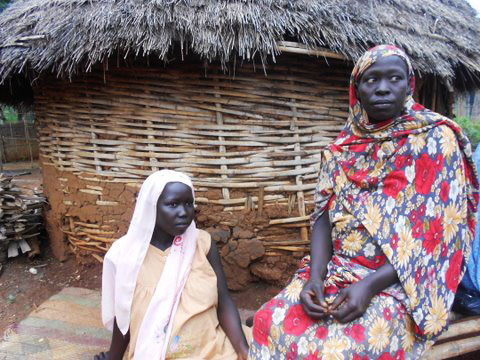
SHERKOLE REFUGEE CAMP, Ethiopia — Miriam was listless as she spoke, sitting on a plastic mat outside of a tukul in the refugee camp. “I can’t even make any sense out of it because it’s too fresh in my mind,” she said, patting a crying young child clamoring for her attention. “My mind is still gripped by this,” Miriam said as she began to tell about the day fighting broke out in the town of Wad el-Mahi in Sudan’s Blue Nile state.
“What happened are the problems that have been brought to us by Omar al-Bashir,” she said.
The clashes between the Sudan Armed Forces, or SAF, and the Sudan People’s Liberation Army, or SPLA, who were part of the former Joint Integrated Units involved her husband, a member of the SPLA component. Since the war started on September 1, Miriam has not seen or heard from him.
Along with four of her children, Miriam was in the SPLA barracks—where the families of soldiers were housed—when fighting began. She said that after fighting broke out on the ground, planes began bombing the town. Then the barracks were attacked.
During the fighting, she saw people killed. The killings “were by Fellata [militia], not by the proper army, but they were [a part of the National Congress Party],” she said.
“We just ran,” Miriam said, explaining that some women who couldn’t run were left behind. She had to flee without her 16-year old daughter Fatima, who was in school at the time of the attacks.
For 14 days, Miriam traveled on foot to the Ethiopian border. Along the way, she stayed in some villages where she found assistance from the local communities. “They helped us a lot, cooking meals for us in the mornings and nights. The adults were given water and porridge,” she said.
The month-long separation from her daughter left a visible emotional toll. “I was crying my heart out every night, until I found her,” Miriam said, water rimming her eyes. “Then my heart rested.” She said she tried going back across the border after receiving some food from the U.N. but was convinced by Ethiopian refugee administration workers to stay, given the ongoing insecurity.
Miriam finally located Fatima within Sherkole camp itself, aided by the Ethiopian refugee administration.
Fatima had arrived at the camp separately. She fled to Ethiopia with a group of people, some of whom she knew, some of whom she didn’t. “I ran back home, but there was nobody there,” when the fighting broke out, she said. “Part of the group couldn’t make it,” Fatima said. “I was lucky.”
This was not the first time that Miriam had been forced to fashion a temporary life out of the scarcities at Sherkole. As a result of the civil war, Miriam stayed in the same camp for 14 years, between 1997 and 2010. She said she stayed long after the signing of the Comprehensive Peace Agreement, which ended the war, because she “wasn’t sure of the peace.”
“A year later, we came running again,” Miriam said, resigned. “Even though [this place] looks familiar, but it is still difficult for me.”
The family tries to make some money by selling zalabya, a fried chickpea dish, in the Sherkole market, a short strip of outdoor stalls found at the center of the camp. Miriam makes the dish, and Fatima, as the oldest child, sells it in the market.
“My husband is not here, I’m focusing on raising five kids by myself, with no job or salary. That is where my focus is,” said Miriam. “But if I tell you what’s in my heart, it will be a long story.”
This post is part of a series based on Enough interviews with Blue Nile refugees in Sherkole refugee camp and Kurmuk, Ethiopia. Details of these testimonies are impossible to verify, but accounts Enough heard have been generally consistent. Some names have been changed to protect the identity of the speaker. For background details about the conflict in Blue Nile, read our overview dispatch.
Omer Ismail contributed to this post.
Photo: Miriam and her 16 year-old daughter Fatima (Enough/Omer Ismail)

